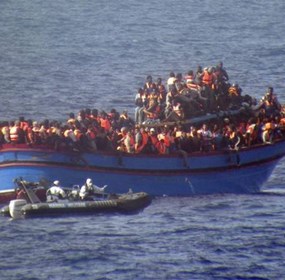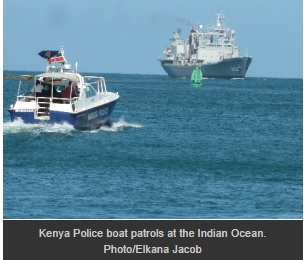Britain's Battle to End Female Genital Mutilation | VICE News
British girls suspected to be at risk of female genital mutilation (FGM) will have their passports confiscated so they cannot be taken out of the country, the UK government announced shortly after releasing its first statistics regarding the frequency of FGM in the country, both coinciding with recent efforts within Britain to curb the practice.
The UK's publicly funded National Health Service (NHS) figures released last week indicate that more than 1,700 women and girls treated by the service since April had previously undergone FGM, including 467 new cases in September alone. While UNICEF
estimates that the global rates of FGM are three times lower than they were 30 years ago, the World Health Organization estimate that seven girls still have their genitals cut or mutilated every minute globally, and as many as
140 million girls are currently living with the results of the procedure.
At its most extreme, FGM involves cutting off the clitoris and labia, then stitching the vagina almost closed. Traditional practitioners who lack any formal medical training often perform the procedure. They work without anesthetic, using crude instruments such as knives, scissors, and razor blades. The results can include infection, infertility, and excruciating pain. Most girls put through it are age 12 or younger.
New prosecutions bring scrutiny to female genital cutting. Read more here.
FGM has been illegal in Britain since 1985, but an estimated 137,000 survivors, born in countries where the practice is common, live in England and Wales as permanent residents, according to a
study released by Equality Now and City University in July.
As the issue persists, campaigners have been working to halt the practice all over the UK. In Bethnal Green, east London, Kayd Somali Arts and Culture Festival is currently holding a week of events under the theme 'imagination," and scheduled among poetry readings and writing workshops was a conference on FGM.
After bowing their heads for a minute's silence in memory of "leader of the global movement" Efua Dorkenoo, the speakers began. Instead of talking, they played video after video in an attempt to describe a procedure that they didn't want to put into words. FGM is still a taboo topic of discussion.
One of the organizers of the event, Saynab Mahamud, 35, came to the UK from Somalia as a refugee when she was 19. Somalia has the highest incidence rate of FGM in the world, with 97.9 percent of women and girls living in the country subjected to the procedure, according to the
WHO.
"This is an issue affecting women, and like a lot of issues affecting women, it's not discussed," Mahamud told VICE News, explaining that there is a societal prohibition around talking about the subject. "If men are suffering, things happen. This is because of sexism, patriarchy, institutionalized ways of being."
"FGM is about women's genitalia. No one wants to discuss women's genitalia," she said.
Refugees in Kenya are being forced back to war-torn Somalia. Read more here.
For Somali's immigrating to the UK, often fleeing violence that has been ravaging the country for more than two decades, according to Mahamud the transition is not easy.
"Britain is hostile when you arrive and can't speak the language. We're visibly black, we're visibly refugees, we're Muslim, we can't speak the language. We deal with racism, Islamophobia, poverty, limited access to resources," she said.
According to Mahamud, shock can make the new immigrants cling to long-standing traditions. "When people come into a different culture that is less conservative they hold on to theirs tighter because they're worried about being overtaken by the culture that is dominant. [With FGM] this is also something that is linked to virginity. Older people become worried that the young people are more at risk because of their arrival in a much more sexualized society, and think that [FGM] might discourage them."
While the law can dissuade those considering performing FGM on their children, Mahamud said real deterrence won't happen without investment, discussion, and education at the grassroots level. According to her, many older women don't realize that their health problems are related with FGM.
"They think that all women suffer from the complaints that they do," she said. "But when you get a doctor who will ask them do they have certain symptoms, they'll respond: 'yes, I have that, yes I have that.'"
Lisa Zimmerman, a teacher in the City Academy Bristol, became involved in FGM campaigning after an attempt to take 12 students on a horse-riding trip was halted by the revelation that 11 had been undergone FGM. Since then she has worked with after-school groups to discuss and campaign against the procedure. She said school is the best place to communicate with students, because outside there is a very different power dynamic.
Zimmerman said that real change may take a generation, and must be instigated by the young. "We've had amazing moments, like a mother breaking down and apologizing for doing it to her daughters. Girls have empowered their mothers to stand up to gender-based violence. Young people are definitely the catalysts for change," she said.
One of her students, Fahma Mohamed, 18, launched a petition in February calling for more information about FGM to be taught in schools. It attracted 230,000 signatures, and gained the backing of UN secretary general Ban Ki-moon, along with Nobel Peace Prize recipient Malala Yousafzai.
"[People] need to realize that this is child abuse, and there are consequences. If you are caught you will be put into jail. They can't think the laws change because they send their daughters abroad, so I definitely think that this is a good position," Mohamed told VICE News.
In Newham, a borough in east London, the UK's first local authority-funded FGM prevention service, facility has been running since March, but so far has received just six referrals, according to project manager Eleanor Tomlinson.
The facility aims to be a one-stop shop for affected women: helping them access specialist healthcare, talk about their experiences, and supporting them with making police reports if they choose to do so. The impact that the facility is having will be monitored. In the meantime, the facility is involved in training professionals — 480 so far — and running community events and a steering group.
"The hardest part is just spreading the word and getting out to the right communities," Newham Councillor Ellie Robinson told VICE News.
They have been granted funding for the first four years and while Robinson expects that initially progress will be slow she said it should pick up as its reputation spreads.
"We're in constant contact, so if they're not meeting their targets it probably won't come as a surprise. We definitely wouldn't cut their funding after the first year, we'd reassess how we were running it and how best to run it," Robinson said.
Robinson said that it's important for other councils to assess whether there's a need for similar services. She said that when dealing with an issue as "abhorrent" as this, "we can't just eradicate it in Newham. It has to be on a national scale."
Back at the Somali Week conference, Sarita Bingeman, the executive director of Justice for FGM Victims UK, said it was hypocritical that Britain "spends resources preventing human rights abuses abroad, but doesn't invest the same means into doing so here" for fear of "offending culture and traditions, being branded racist, and sometimes sheer ignorance."
But the very name of Bingeman's organization highlights one of the key disconnects between activists campaigning to stamp out this practice, and those who come from a culture where it has traditionally been accepted.
Outside the conference room, organizer Mahamud mentioned how wary she is of talking to the media because of the negative and unfair way they often portray Somalis. One example of this, she said, is the language used in relation to FGM.
She said that while female genital mutilation is a terrible thing, she wants it to be clear that "Somali women don't see themselves as victims. We never use that term. Somali women are powerful."




 The fixing of the dates now means that Kenya may have lost an attempt to challenge ICJ jurisdiction to hear the case. “The President of the Court made the Order having regard to the views of the Parties. The subsequent procedure has been reserved for further decision,” a Court official said.
The fixing of the dates now means that Kenya may have lost an attempt to challenge ICJ jurisdiction to hear the case. “The President of the Court made the Order having regard to the views of the Parties. The subsequent procedure has been reserved for further decision,” a Court official said.